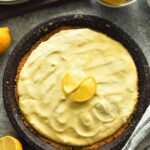Lemon Freeze Recipe
This No Bake Lemon Pie is tart, but sweet with a thick crust that holds a luscious lemony filling. Creamy and dreamy, this Lemon Freeze recipe tastes like summer in every bite.
Servings: 8
Calories: 308kcal
Ingredients
- 2 1/2 cups corn flakes cereal
- 1/3 cup butter unsalted
- 5 tablespoons granulated sugar divided
- 2 large eggs pasteurized*, separated
- 1 can sweetened condensed milk 14 ounces, 1 1/3 cups
- 1/2 cup lemon juice fresh
- 3/4 teaspoon lemon peel optional
Instructions
- Put cornflakes in a zip bag and crush with a rolling pin until the cornflakes are in fine crumbs.
- Melt the butter. Pour the butter into a small bowl with the crumbs and 3 tablespoons of sugar, mix well. Press the crumb mixture onto the bottom and sides of a 9-inch pie pan.
- Beat egg yolks until creamy in a medium sized bowl. Mix in sweetened condensed milk. Add in all of the lemon juice and stir until well mixed and thickened.
- Beat the egg whites until stiff. Add in the 2 tablespoons sugar a little at a time.
- Gently fold the egg whites into the condensed milk mixture. Pour into the pie crust.
- Freeze until firm, at least 3 hours.
Notes
*To Pasteurize Egg Whites:
- Place 2 room temperature eggs into a pot and cover with cold water until they are under an inch of water. Remove the eggs. Add in the thermometer, making sure it does not touch bottom or sides of the pot.
- Turn the heat to medium. Watching the thermometer, let the temperature come up to 138.° Take the pot off the heat or turn to low. Using a slotted spoon, gently lower the eggs into the pot.
- Let it sit for 3-5 minutes between 138°-142°F watching the thermometer constantly to make sure it does not rise in temperature. If it goes above this, the eggs will begin to cook and can't be used to make the meringue. They can still be cooked though so don't throw them out if this happens, just break the eggs and put them into an airtight container and use at another time. This happened to me a few times, so you are not alone! Just start the process over again with two new eggs.
- Run the eggs under cold water to stop the cooking process.
- To pasteurize the egg yolks in the microwave, you will need 3 clean forks, 1 tablespoon of lemon juice or white wine vinegar and 2 tablespoons of water. Separate your eggs (put whites in a separate bowl) and put egg yolks in a microwave safe bowl. Whisk them well with the first fork. Add in lemon juice or vinegar, mix with first fork. Add in the water and mix with the same fork
- Cover the bowl well with plastic wrap and heat on high until the mixture starts to rise (about 45-60 seconds) cook for 8 more seconds. Open the plastic and whisk eggs vigorously with 2nd clean fork.
- Recover with the plastic and immediately put the egg yolks back in the microwave. Heat on high again until the surface begins to rise, cook for 8 more seconds once this starts happening. Pull from the microwave and whisk vigorously with the 3rd clean fork. The yolks are now pasteurized.
Nutrition
Calories: 308kcal | Carbohydrates: 43g | Protein: 6g | Fat: 13g | Saturated Fat: 8g | Polyunsaturated Fat: 1g | Monounsaturated Fat: 4g | Trans Fat: 1g | Cholesterol: 84mg | Sodium: 212mg | Potassium: 234mg | Fiber: 1g | Sugar: 36g | Vitamin A: 593IU | Vitamin C: 9mg | Calcium: 152mg | Iron: 3mg
